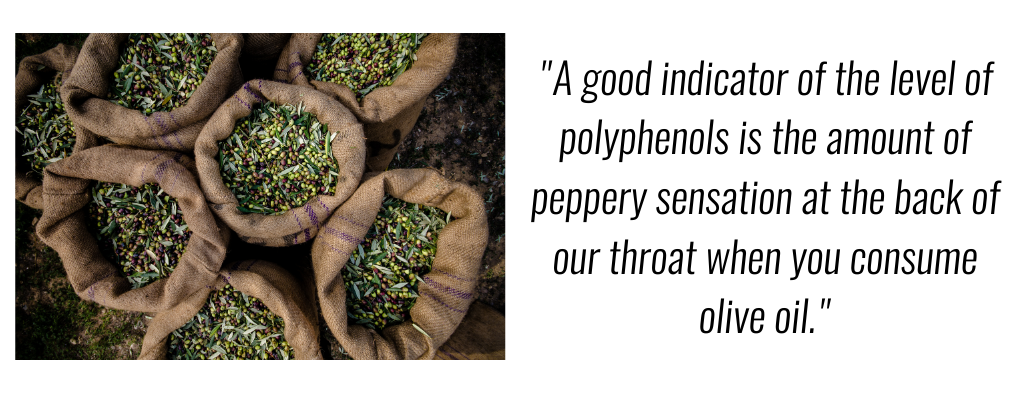Why is Olive Oil Good for You?
You may know already how good the taste of olive oil is, but did you also know that they have benefits for our health as well? Olive oil, especially extra virgin olive oil, is chock full of antioxidants that are responsible for preventing stroke, heart disease, early dementia, and Alzheimer’s. Studies have shown that in people living in countries with diets rich in olive oil (such as Italy, Greece and Spain) tend to live longer and have less heart defects. According to the Heart and Stroke Foundation, heart disease and strokes are leading causes of Canadian deaths, accounting for 27.3% of all deaths (Statistics Canada). Since heart disease is preventable, we’ve decided to show the number of ways that olive oil can help your heart health, as well as fight other conditions.
It's Full of Antioxidants
As we mentioned in our article, "Aren't All Olive Oils the Same?", extra virgin olive oil is unrefined. This means that during the extraction process no chemicals are sued and the oil retains much of its nutrients, including polyphenols.

A good indicator of the level of polyphenols is the amount of peppery sensation at the back of our throat when you consume olive oil. This is why we don’t recommend storing or cooking olive oil at high temperatures as that will eliminate those good nutrients.
From Seray Karaban, in her chapter Olive Oil: Antioxidant Compounds and Their Potential Effects Over Health, writes that "Hydroxytyrosol, tyrosol, oleuropein and oleocanthal are the phenolic compounds that are mainly responsible for antioxidant activity, protection from blood lipid oxidation, anti-inflammatory activity, the anticarcinogenic potential, the oxidative stress resistance, and other positive impacts over human health."
It Lowers Your "Bad" Cholesterol
So how exactly does olive oil prevent heart disease? Well, one factor that puts you at high risk is high cholesterol. Cholesterol is a waxy substance that is produced by the liver and travels through the blood in your body. It is also found in certain foods, such as meat and oils. There are two types of cholesterol, low-density lipoprotein (LDL), and high-density lipoprotein (HDL). LDL, which is considered to be the “bad” cholesterol, is what makes up most of the cholesterol in our body while the rest is HDL, the “good” cholesterol.” The job of HDL is to carry LDL to the liver to be flushed out. Cholesterol itself isn’t bad; humans need it to build cells. However, if there is too much bad cholesterol building up in places such as your arteries, blood cannot get through, and that can induce a stroke or heart attack.
It's Got Unsaturated Fats
So how can you get more HDL into the body? Studies suggest that replacing the saturated fats in your diet with monounsaturated/polyunsaturated fats lowers the levels of LDL, therefore lowering the risk of heart attacks. Some examples of saturated fats include (but are not limited to): red and deli meats, cheese, milk, pastries, and cake. Unsaturated fats are found in avocados, nuts/seeds, fish, and of course, olive oil. One of these monounsaturated fats in olive oil is oleic acid. Oleic acid is said to be anti-inflammatory and may be responsible for the hypotensive (blood pressure reducing) effects of olive oil.
Similar to oleic acid, oleocanthal, a phenolic compound in olive oil, has anti-inflammatory properties, having similar effects to ibuprofen (they are both activators of TRPA1 ion channel). In fact, 50 g (more than three and a half tablespoons) of a typical extra virgin olive oil per day contains an amount of oleocanthal with similar in vitro anti-inflammatory effect as 1/10 of the adult ibuprofen. Oleocanthal is said to be prevent cancer and Alzheimer's Disease because of its beta-amyloid plaque (suspected to be one of the causes of Dementia and Alzheimer's) clearing properties.

How Can I Incorporate More Olive Oil Into My Diet?
How to incorporate more olive oil in your diet? Wherever possible, substitute butter for olive oil. Olive oil can be used to sauté vegetables, meats, eggs. It can be drizzled over popcorn, even used to bake with. If you haven’t already, replace your store-bought vinaigrette (that are often full of calories and sugar) with olive oil and balsamic vinegar from Aurelius Food Co. Olive oil is also great for dipping into bread. Just mix some balsamic vinegar with your favourite olive oil and dip away. Our Early Harvest extra virgin olive oil and Balsamico Modena are the perfect combination for any meal or snack.
If olive oil isn't a main staple in your diet, maybe you’ll be convinced after reading this article. Once restrictions lift up again, we invite you to visit our store and sample our fine olive oils (and vinegars). Read up on how to sample olive oil here.
Some more info can be found here: "Aren't All Olive Oils the Same?"
Sources:
https://www.webmd.com/heart-disease/ldl-cholesterol-the-bad-cholesterol#1
https://www.health.harvard.edu/staying-healthy/is-extra-virgin-olive-oil-extra-healthy
https://www.healthline.com/nutrition/11-proven-benefits-of-olive-oil#TOC_TITLE_HDR_2
https://www.stockland.com.au/retirement-living/news/16-health-benefits-of-extra-virgin-olive-oil
https://www.intechopen.com/books/functional-foods/olive-oil-antioxidant-compounds-and-their-potential-effects-over-health

thanks for the information youssefweb7-online forever